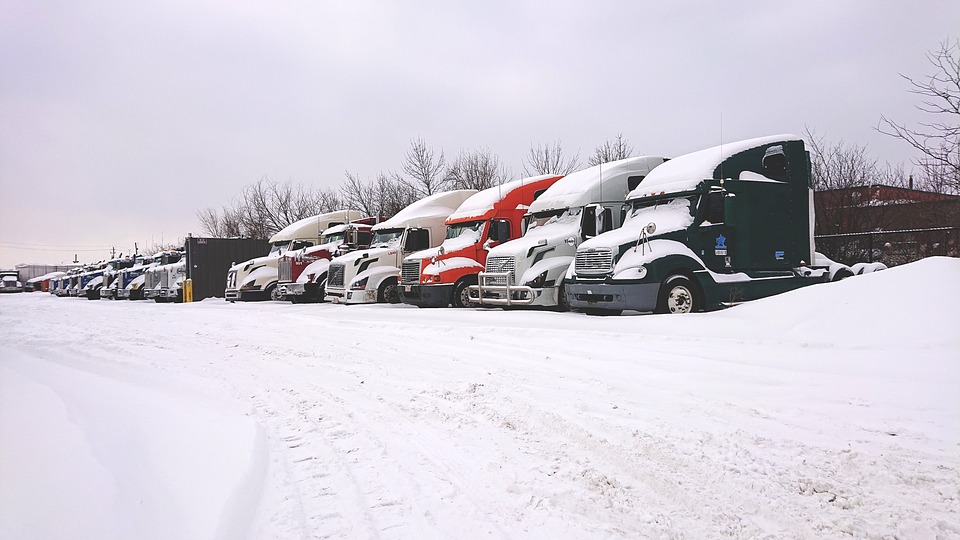Need help? We're here!
(888) 312-8812 Login Signup7 Common Truck Parts Problems During Winter and How to Avoid Them
January 07, 2021

Image Source: Pixabay
Heavy duty trucks may look powerful because of their huge size, but come winter, they're no different from smaller trucks and cars. Icy highways and snow-covered roads can make it twice as difficult to maneuver since a bigger rig often demands maneuvering skills and greater skid control than smaller vehicles.
But the challenges brought about by the cold season do not end there. Some truck parts can also become extremely vulnerable to the cold weather. So, it pays to know which of these parts are more susceptible to damage, how to prevent them from happening, and what to do in case they happen to you. Before the temperature drops, it’s also smart to prepare your fleet for the winter season to reduce the risk of unexpected breakdowns and costly repairs.
Dead Batteries
The battery works harder to start the engine when temperatures drop below the freezing point. It can take up to twice the amount of energy as required on a normal day. So if it is already more than two years old or if you think its capacity can no longer pull through the cold season, then you’d better replace it with a new one.
Failure to replace the battery sooner can lead to more serious problems later on. Aside from starting the engine, the battery also powers a lot of systems, such as the heater and headlights. So it can get overworked and eventually fail during the winter months. This is where jumper cables come in handy, so be sure to have one inside your truck at all times.
If your truck struggles to start even with a healthy battery, understanding winter driving challenges faced by truck drivers can help you better anticipate and troubleshoot issues on the road.
Frozen Windshield Wipers
The windshield wipers are among the most exposed truck parts during winter. And no matter how tough and durable they are, they can eventually get damaged due to the cold, freezing weather. They can freeze to the windshield, and the blades can get torn when the wipers are turned on.
Broken windshield wipers can be very frustrating, especially when driving through rain, sleet, or snow. Don’t let this happen to you. Be sure to check them before you hit the road, or better yet, replace the wiper blades with ones that are explicitly made for icy conditions.
Also, make it a habit to clear accumulated ice and snow from the windshield before you head out each day. You may use a windshield de-icer spray to get the job done quickly and easily. A little extra effort in visibility maintenance can go a long way in ensuring safety, especially during long-haul driving.
Tires Below the Recommended PSI
Under-inflated tires do not perform well on snowy and icy roads, so it is highly recommended to check your tire pressure before driving during the winter months. For every 10 degrees F of temperature drop, your tires lose one pound per square inch. So, it’s never a good idea to hit the road if your tires are not inflated to the proper pressure rating.
Snow chains or tire chains may also be used to provide your truck maximum traction when driving through snow and ice. Find out which states allow the use of these products, and be sure to use the correct number of chains and size in your truck.
For added comfort and safety, make sure you and your rig are equipped to handle the cold. Staying warm during the winter season helps drivers remain alert and comfortable on long, icy routes.
Spark Plugs Failure
Many truckers put off checking their spark plugs until they start having problems starting their vehicles during the winter season. The spark plug in your engine is the one responsible for igniting the air and fuel mixture in the combustion chamber, allowing your vehicle to move. When it fails to do its job properly, chances are your vehicle won’t start.
Make sure to check the spark plugs when doing your winter preparation. Any fouled, worn, cracked, or old plugs should be replaced. To better care for them during the cold season, mechanics recommend letting your truck warm up for five minutes or so before hitting the road.
Having a winter kit with essential tools on board can also make a big difference when dealing with emergencies like this, ensuring you’re never stranded without the right gear.
Starter Issues
If your truck has trouble starting during the winter season, it could be one of three things: a dead battery, a malfunctioning alternator, or a starter issue. To know if it’s the starter that’s causing the trouble, try starting your vehicle. If all electricity is working but all you get is a rattling or a clicking sound, then the starter needs to be replaced.
Clogged Fuel Filter
Seasoned truckers are very much familiar with this common winter truck part problem. When the weather gets really cold, diesel fuel can easily gel and turn into sludge, causing the filter to get clogged. That is why truckers recommend treating diesel fuel with winter additives to prevent this from happening.
However, in southern states, treating diesel fuel with winter additives is not a usual practice. So, what you can do instead is to leave your truck idling for long periods to take advantage of the cabin heater. This allows the fuel to keep flowing and helps prevent the filter from getting clogged.
In case the fuel filter becomes frozen, you may wrap around a plug-in heater to thaw it. Or, put in the spare filter that you keep on hand so that you can get back on the road in no time.
Frozen Doors and Locks
During winter, it is not uncommon to see your truck doors frozen shut, especially if you leave your truck out in the cold for a long period of time. The handle or the lock sometimes freeze, rendering the door useless.
To avoid frozen doors and locks, as much as possible, park your truck in a covered area. If this can’t be done, especially when you are out to deliver goods overnight, make sure to have a de-icer on hand. De-icer sprays or lock de-icer are very much available online, so it’s easy to purchase one for your truck.
The winter weather may take a toll on your truck parts, but this can be very much avoided with the right preparation.If you need replacement parts for your truck, check out our online catalog here at FinditParts. We have a large selection of heavy duty truck and trailer parts at reasonable prices. Some of the brands that we carry offer products specifically designed for the cold weather, including Truck-Lite, Anco, and CRC Industries. Feel free to check them out.



